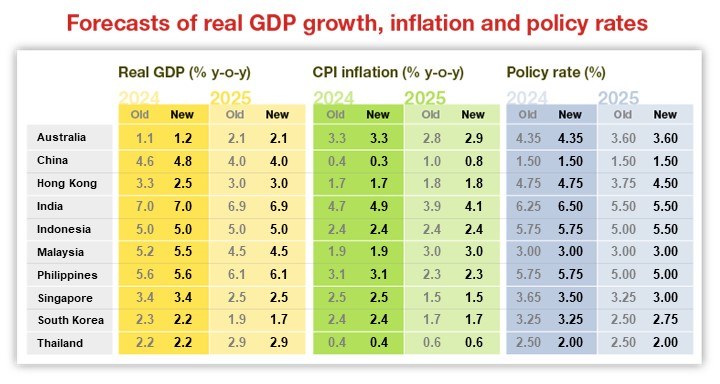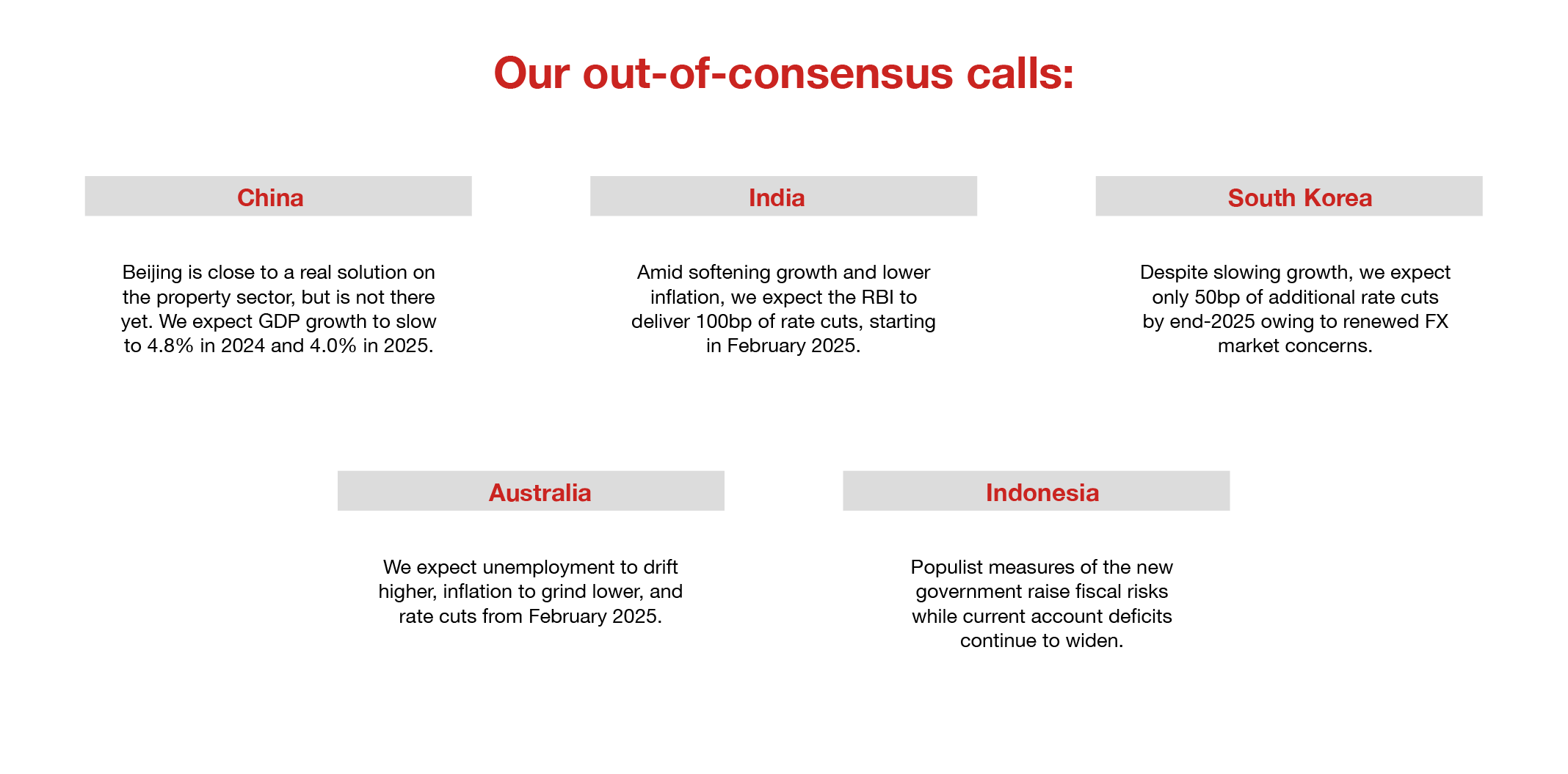
Asia Economic Monthly: The Trump curveball for Asia
Asia is better prepared for Donald Trump’s second presidency, but a larger economic growth drag and disinflation now look more likely in 2025.
- Higher tariffs, weaker global demand and more policy uncertainty are set to weigh on Asia’s economic growth.
- Disinflation is a bigger risk for Asia, given weaker growth, lower energy prices and the prospect of increased Chinese exports into the rest of Asia.
- While the broader economic and geopolitical impact is negative for Asia, especially for China and South Korea, we see India and Malaysia as relative beneficiaries due to ongoing supply chain shifts.
Donald Trump has won the US presidential election. Tariffs and tax policy will likely be the focus under Trump 2.0, according to Nomura analysis. The administration may implement 60% tariffs against China, which may come into effect by mid-2025, and baseline tariffs of 10% on most foreign products imported by the US.
What Trump 2.0 means for Asia
Asia is better prepared this time. Trump’s re-election has less of a shock factor given greater familiarity with his policies. Asia is also more resilient, due to the ongoing trends of US-China decoupling, shifts in global supply chains and lower Asian exports to China. Yet, Trump 2.0 will likely mean more policy uncertainty, which may be a negative for Asia.
There could be a larger drag on 2025 GDP growth. Even prior to the US elections, Nomura’s leading indicators on exports and memory prices suggested an impending slowdown in Asia’s export growth, as well as growing evidence of softening domestic demand in India, Thailand and South Korea. Though some front-loading of exports is possible ahead of the actual tariff implementation, weaker global growth could slow Asian exports in the second half of 2025.
There could also be more disinflation ahead for Asia due to weaker growth, more economic slack, lower energy prices and the risk of more Chinese exports flooding Asia. Inflation could be lower by 0.1-0.2 percentage points in 2025, relative to Nomura’s current baseline estimates.
Some economies may be supply chain beneficiaries. A 60% tariff on Chinese exports to the US can lead to import substitution, with Southeast Asian economies having a potential advantage. It could also lead to trade diversion in which China routes exports through other countries, although there is a risk that this could prompt greater scrutiny under Trump 2.0. Supply chain diversification will continue in the medium term, with India and Malaysia likely to be the big beneficiaries in the electronics and semiconductor sectors.
Trump’s protectionist stance will further the US-versus-China-centric regional blocs. Under Trump 2.0, we expect China-ASEAN trade and investment integration to strengthen, while India, Australia, Japan and South Korea appear more closely aligned to the US.
Policy implications
Nomura’s US economists expect that tariffs will generally be a negative for the US economy, leading to lower growth and adding roughly 0.75 percentage points to US inflation in 2025. As the Fed is likely to pause its rate cutting cycle during a tariff-driven inflation spike, Nomura’s US economists now expect only one cut in 2025 after cutting once in December 2024, leaving the fed funds rate at 4.125% at the end of 2025.
The policy response in Asia may be more nuanced.
Trump’s victory increases the downside risk to China’s export growth and will likely lead to a larger stimulus package from Beijing. With fewer Fed rate cuts, an increased likelihood of Japanese yen depreciation and recent hawkish rhetoric from Bank of Japan Governor Kazuo Ueda, we expect a 25-basis-points hike in December by the Bank of Japan, followed by 25-basis-points hikes in each of April and July next year.
Asia will also see more monetary policy divergence. Slower growth and disinflation call for more policy easing, but higher US terminal rates and tighter global financial conditions would create a tricky environment for Asian central banks that are more sensitive to Fed and FX-related risks, such as Bank Indonesia and Bank of Korea. For other Asian central banks, we expect policy decoupling from the Fed.
Winners and losers
While the broader economic and geopolitical impact of Trump’s victory is negative for Asia, especially for China and South Korea, Nomura’s economic analysis shows that India and Malaysia should be relative beneficiaries.
China is directly in the line of Trump’s fire. South Korea is likely to be adversely impacted due to weaker growth and headwinds for the Korean electric vehicle and battery industries. On the other hand, India and the US share deep economic and strategic interests, which may bode well for the Asian country. Similarly, Malaysia may benefit over time from higher foreign direct investment inflows from multinational corporations looking to diversify their supply chains.

For more on our growth projections, read our full report.
Contributor

Sonal Varma
Chief Economist, India and Asia ex-Japan

Si Ying Toh
Economist, Asia ex-Japan
Disclaimer
This content has been prepared by Nomura solely for information purposes, and is not an offer to buy or sell or provide (as the case may be) or a solicitation of an offer to buy or sell or enter into any agreement with respect to any security, product, service (including but not limited to investment advisory services) or investment. The opinions expressed in the content do not constitute investment advice and independent advice should be sought where appropriate.The content contains general information only and does not take into account the individual objectives, financial situation or needs of a person. All information, opinions and estimates expressed in the content are current as of the date of publication, are subject to change without notice, and may become outdated over time. To the extent that any materials or investment services on or referred to in the content are construed to be regulated activities under the local laws of any jurisdiction and are made available to persons resident in such jurisdiction, they shall only be made available through appropriately licenced Nomura entities in that jurisdiction or otherwise through Nomura entities that are exempt from applicable licensing and regulatory requirements in that jurisdiction. For more information please go to https://www.nomuraholdings.com/policy/terms.html.




